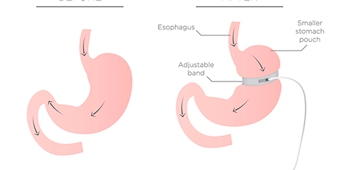
A gastric sleeve is a bariatric surgery where 80% of the stomach is separated and removed. The rest of the stomach is then given the shape of a tube that resembles a “sleeve” or a banana. With this procedure, the stomach gets highly restricted, which of course limits food intake drastically from that moment on.
Getting a gastric sleeve surgery is surely a life changing event. Patients that go through any bariatric surgery must change their entire relation with food. From the choices they make with food, to the frequency with which they eat, the size of their portions, even the way they chew. A healthy diet is key when it comes to obtaining the most benefits a gastric sleeve surgery can offer.
But these changes in eating habits should start way before the surgical intervention itself. Starting to diet at least 3 weeks before the surgery, not only gives you a head start to your new way of life, but it also helps your body get ready and in its most optimal condition for surgery.
Here are some guidelines and practical tips for starting and maintaining a long-term gastric sleeve diet.
Pre-operation phase
Dieting at least 3 weeks before surgery will get you in top shape for the big day. It has been reported that pre-operative weight loss reduces postoperative complications and that it may even shorten the time of surgery.
A low-calorie diet is highly recommended before any bariatric surgery. The most important goal to achieve with the pre-operation diet is to strengthen your immune system; however, a reduction in the liver’s volume and in the visceral adipose tissue is also very convenient because it makes it easier for the surgeon to intervene.
When it comes to preparing yourself for gastric surgery, a low carbohydrate diet is more effective than a low-fat diet. It helps you lose weight fast, but it also improves insulin sensitivity and reduces lipid concentrations.
Three weeks before your surgery:
- Reduce your calory intake to an approximate of 800-1,200 a day. Ask your doctor for a safe limit of calories that will work for you.
- Increase your protein intake to 60 gr a day. To achieve this, always start by eating your protein portion.
- Avoid carbohydrates like pasta, bread, rice, and cereals.
- Eliminate all sugars.
- Drink lots of water to keep yourself hydrated.
- Whenever you eat, chew thoroughly.
- Eat small portions in every meal
- Limit to 3 meals a day
- Start taking vitamins. Ask your doctor which daily multivitamin is the best choice for you.
A week before the surgery, your doctor will ask you to stop or change doses of some medications.
Two days before surgery, you’ll have switch to a only clear liquids diet. This means no coffee, no juices, no sodas nor any carbonated drinks. During that day, you must drink mostly water. Low-sodium broth, sugar free popsicles and jello are other safe options. You may drink 1 protein shake, at most. Ask your doctor if this is possible in your case.
At midnight on the day of your surgery, you start fasting. You may not drink any liquids, not even water, and you may not eat any food, at all. This is fundamental. Your stomach and digestive system should be totally empty before surgery. Not losing any weight with your gastric sleeve diet on the 2 weeks prior may not be reason enough to cancel nor postpone your surgery, but not fasting properly at least 8 hours prior certainly could be.
Post-operation Phase
Your clear liquids diet will continue for one week after your surgery. Drinking enough water is very important. You should aim for a goal of 2.5 liters minimum of water each day. But you should start slow. Start with half a cup of water and increment the amount gradually.
Sugar free liquids like broth, popsicles and jello, decaf tea or coffee are all valid choices from day 3 to 7 after surgery. Protein shakes are not allowed during this first week, but vitamin intake is very important. Your doctor will prescribe specific vitamins for each period of your gastric sleeve diet.
The good news about this is that, either you won’t feel very eager to eat because of your procedure, or you won’t experience big appetite as much as you’re used to. In gastric sleeve surgery, the surgeon removes the part of the stomach that produces most of the ghrelin hormone. This hormone travels through your bloodstream to signal your brain when your stomach is empty and hungry. In this case, your body will not be urging you to eat as much as it would in normal circumstances. However, as days passes by, avoiding any food will begin to turn more and more difficult. It is very important that you resist and stick to your gastric sleeve diet. Failing to do so can cause complications, like diarrhea, bowel obstruction, and constipation, stressing your digestive system unnecessarily.
Two weeks after your surgery, you may begin a liquid foods diet. Protein shakes, milk products, fat free Greek yogurt, soups, puddings, and watery oatmeal are good options during this period. Keep your portions small. Half a cup in small sips will do. Remember to eat and drink slowly to avoid nausea, diarrhea and other complications.
When you reach the three weeks milestone, your diet will now include pureed and very soft foods. Scrambled eggs, cooked and smashed vegetables, grounded meat, soft fish and tuna, humus, cottage cheese, yogurt and pates are great choices. During this time:
- Eat 60 to 80 gr of protein per day. Protein intake is very important during a gastric sleeve diet to prevent malnutrition.
- Start your meals with your portion of protein first so you can obtain enough of it before you get full.
- Drink liquids 30 minutes before and 30 minutes after each meal. Avoid drinking liquids while eating food, as this may ruin your appetite and cause nausea. Remember you should be drinking at least 2.5 liters of water a day.
- You may eat 3 to 5 meals per day during this time.
- Each meal should be the size of half a cup or 6 tablespoons of food.
- Remember to take small bites and small sips.
- Eat very slowly. Make your meals last 20 to 30 minutes.
In week 4, your gastric sleeve diet should consist mainly in soft foods. Use the same recommendations as week 3. Your meals may now include rice, lentils, soft fruits and vegetables, eggs and grounded meat, poultry and fish. During this period:
- Remember to always choose low-fat and low carbohydrate foods.
- Use olive or coconut oil when you cook your meals.
- Avoid greasy, spicy and sugary foods.
From week 5 onward, your diet may gradually include solid foods so you can slowly gravitate to your long-term eating habits and new lifestyle.
Ideal solid food to consume during your gastric sleeve diet are:
- Vegetables
- Fruits
- Legumes
- Lentils
- Poultry
- Lean meat
- Tuna
- Fish
- Eggs
- Turkey
- Soy
- Yogurt
- Hard cheeses
- Cottage cheese
- Crackers
- Low fat foods
- Low sugar snacks
- Low sodium alternatives
Foods to avoid are:
- Whole bread
- Whole milk and whole milk products
- Pastas
- Spicy foods
- Fried foods
- Breaded foods
- Popcorn
- Nuts and seeds
- High-calory, high fat and high carbohydrate foods
- Junk food
- Foods with high fiber
- Fibrous vegetables
- Sugary drinks
- Alcohol
There’s a chance that you will eventually be able to eat some of these foods, with minor or no discomfort. Even so, most of these foods are not very convenient if your goal is to lose weight and stay healthy. One indulgence every once in a while, might be ok, but remember that overdoing it would set drawbacks in your advances and that may pose risks to your health later.
For your long-term gastric sleeve diet, eat 3 meals a day and at least 2.5 liters of water. Make sure you eat 60-80 gr of protein daily and remember to always take your multivitamin supplement. The major post-operative risks for patients that have had bariatric surgery are malnutrition due to lack of protein and vitamin intake, and dehydration. Therefore, reaching those daily goals in your meals is very important.
To make sure you are eating properly during your gastric sleeve diet, use these practical strategies:
- Take advantage of nutrition apps. Some apps help you calculate how many calories and proteins you’ve consumed. All you have to do is register the meals you’ve eaten in the day, detailing its ingredients and portions. These apps will also warn you if you are below or beyond your set limits.
- Keep a food diary. Some nutrition apps already have this feature. If yours doesn’t, you may keep a register of the foods you’ve eaten each day in a notebook or an electronic log. If your stomach gets upset with one meal, you’ll be able to track which meal caused it and will be able to avoid it in the future or to change its ingredients. You’ll also be able to track any changes in reactions to those meals, if you eat them weeks or months later.
- Use a hydration app. Hydration apps are a great way to keep track of how much water you’re drinking during the day, and most importantly: they help you remember the moments when you’re supposed to be drinking water, with a simple alarm.
- Keep sources of water close and available for you. Make sure you always carry a bottle of water with you, specially if you go out. Remember to drink more water than usual if you experience any diarrhea or if you vomit.
- Ask for small portions or share your meals. If you go out to a restaurant, always ask for the smaller version of the dish, or order with the intention to share with your companion. Many restaurants add the number of calories of their dishes to the menu. Consider that information when you make your order.
- Avoid empty calories. Candies, alcoholic drinks or other snacks will fill your stomach but won’t provide any nutrition.
- Stop grazing. Stress eating, eating when you are bored, even social eating while watching television, or binging are all unhealthy eating patterns that you must eliminate from your lifestyle.
- Plan your meals. If you plan your meals for the week, you can be more strategic with your grocery shopping, and resist from buying food you don’t really need.
- Don’t cheat your gastric sleeve diet. Stick to your diet to obtain the most benefits out of your surgery and weight loss. Remember that good eating habits is the single most effective tool to keep yourself healthy and safe after bariatric surgery.
If you would like to know more about the gastric sleeve diet or any bariatric surgery, call our clinic LIMARP International Center of Excellence for Obesity, located in Tijuana, Mexico. Our team of certified experts will be glad to help.


